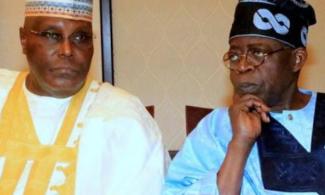
According to the report, the history of graft allegations surrounding the two candidates means neither is likely to curb corruption in the run-up to February’s vote.
The presidential candidates of the ruling All Progressives Congress (APC) and opposition Peoples Democratic Party (PDP), Bola Tinubu and Atiku Abubakar, have been described as unfit to end corruption in the country.
According to a Bloomberg report, the duo's past records show that neither of them is free of corruption allegations, adding that seven years after President Muhammadu Buhari promised to swiftly defeat corruption, corruption in Nigeria has become worse than it was in 2015.

According to the report, the history of graft allegations surrounding the two candidates means neither is likely to curb corruption in the run-up to February’s vote.
"Front-runner Bola Tinubu, who secured the ruling party’s nomination earlier this month, was being investigated by the country’s anti-corruption agency as recently as last June. Three decades ago he fought a lawsuit in which the US government accused him of laundering the proceeds of heroin trafficking and eventually reached a settlement.
"Atiku Abubakar, his chief rival, brought tens of millions of dollars of ‘suspect funds’ into the US when he was Nigeria’s vice president in the 2000s, according to a US Senate report, and was implicated in a bribery case that resulted in the imprisonment of an American congressman. Neither episode resulted in charges against Abubakar.
The Spokesmen for Tinubu and Abubakar didn’t respond to requests made by Bloomberg for comments.
The report noted that Nigeria’s next president will face a daunting challenge to turn around Africa’s largest economy.
It further noted that falling oil production threatens Nigeria’s place as the continent’s biggest crude producer.
It lamented how inflation is soaring in the country with more than half of the working-age population either unemployed or underemployed.
"The local currency has depreciated steeply under outgoing President Muhammadu Buhari, falling from around N220 to the US dollar on the widely-used parallel market when he was first elected in early 2015 to about N600 this week.
"Nigeria vies with India as the country with the highest number of people living in extreme poverty despite having a seventh of the population. Meanwhile, secessionists, Islamist militants and armed criminal gangs terrorize large swathes of territory.
Efforts to restore security and fix the economy alone will likely fall short because there’s an unavoidable connection between financial graft and government dysfunction in Nigeria, said Leena Koni Hoffmann, an associate fellow at Chatham House in London.
Corruption “hollows systems out and cripples them from the inside,” she said.
"The race will see the two wealthy septuagenarians mobilize impressive political machines built over more than 30 years pursuing power in Africa’s most-populous country. Voters in Nigeria are often offered cash, food or clothing to persuade them to cast their ballots for particular candidates.
The report recalled how on the eve of the last election in 2019, two armoured bank vans were photographed driving into Tinubu’s home.
“If I have money to spend, if I like, I give it to the people for free of charge as long as it’s not to buy votes,” Tinubu told reporters when asked what the vehicles were transporting.
"Tinubu and Abubakar have cultivated deep systems of political patronage, according to Hoffmann. Both men excel at “engineering and expanding political networks through co-optation, through channeling and redistributing money and positions and favors,” she said.
"Tinubu, 70, who lives in Lagos’s wealthiest neighborhood, says he made his fortune before going into politics by investing well and working as an accountant for companies including Deloitte LLP.
“Abubakar, 75, who splits his time between Nigeria and Dubai, spent two decades working for the government’s customs department and co-founded a large logistics and oil services firm that has operated concessions at Nigerian ports,” the report added.
It recalled a report published in 2010 by the US Senate’s Permanent Subcommittee on Investigations, which said one of Abubakar’s wives helped her husband bring more than $40 million in “suspect funds” into the US while he was Nigeria’s vice president.
This included at least $1.7 million in bribes paid by Siemens AG. Abubakar and his then-spouse previously have denied any wrongdoing.
Former US Representative William Jefferson was sentenced to 13 years in prison in 2009 for taking bribes from American companies interested in doing business in Nigeria and Ghana.
In July 2005, Jefferson told a cooperating witness that Atiku Abubakar had also agreed to accept a bribe in exchange for his assistance, according to the Louisiana congressman’s indictment.
Atiku, however, denied the allegations, saying he had no personal or business relationship with Jefferson.
Abubakar’s hopes of succeeding President Olusegun Obasanjo in 2007 were torpedoed when the EFCC declared him unfit to hold public office and a Nigerian Senate panel recommended his prosecution for allegedly diverting government funds.
But Atiku has described it as political persecution.
Both Tinubu and Atiku will focus on issues other than corruption while campaigning, said Hoffmann. “They know it’s not part of their political image,” she said.